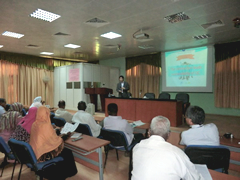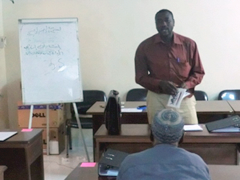- Home
- Technical Cooperation Projects
- Index of Countries
- Africa
- Sudan
- Capacity Development Project for Provision of the Services for Basic Human Needs in Kassala
- Project News
- Learning the importance of "organization culture" through Kaizen Manga
Project News
2012-06-17
Learning the importance of "organization culture" through Kaizen Manga
 Training in National Water Corporation. Mr. Onodera explained Kaizen in front of about 30 trainees.
Training in National Water Corporation. Mr. Onodera explained Kaizen in front of about 30 trainees.
Kaizen Manga, a Japanese comic published by Tottori Prefecture and translated in Arabic by Capacity Development Project for Provision of the Services for Basic Human Needs in Kassala (K-TOP), is now started to be introduced in several governmental institutions in Sudan. It had been used for training in Kassala State Ministry of Finance before. Recently, it was used for training on organizational control in Sudan National Water Corporation on 8th May 2012, White Nile State Water Corporation (SWC) on 4th June and Sennar SWC on 10th June.
Jun Onodera, a Japanese Expert who was in charge of these trainings, emphasized that, it is important to focus on the organization culture when someone tries to teach Kaizen in abroad. In particular, there are three factors which have supported the development of Kaizen movement in Japan: 1) share the goal of the organization among every staffs; 2) keep communication for collaboration or cooperation; and 3) take the record (history) of the work in order to clarify the lessons and problems. In short, Kaizen is based on proceeding tasks in the way of "work as one and cooperate with each other". Moreover, he mentioned the commitment from top manager is also a crucial point. Depend on whether Top Manager is aware of making the work environment to lead staffs who engage in Kaizen activities feel sufficiency. For example, if the organizational climate makes staffs being afraid that top manager might ask them additional tasks due to the reduction of overtime work after making the work more efficient, Kaizen will not continue in such place. Whether top manager acknowledges the effort of staffs or not will make success or failure of Kaizen.
This is the issue which Mr. Onodera often faced with. For instance, there were a staff felt desperate with the corruption of his or her organization and a lack of understanding of top manager. Furthermore, Mr. Onodera said when he met a person who said honestly he will use the knowledge and the way of thinking earned in the training for his better career and not for the improvement of his organization, he felt powerlessness. Therefore, he emphasized in the training that, in order to succeed Kaizen, not to concentrate only on the practical method and understand the importance of organization culture.
 In Sennar SWC, there was a review of the last lecture in every morning during the training term. The photo was taken when they were reviewing Kaizen activities with referring Kaizen Manga.
In Sennar SWC, there was a review of the last lecture in every morning during the training term. The photo was taken when they were reviewing Kaizen activities with referring Kaizen Manga.
During the training, there was good news too. On the next day of the introduction of Kaizen activities, Sudanese staffs in Sennar SWC started the brainstorming by their initiatives to clarify the problems in their daily works. This act was surprise and, at the same time, hope for Mr. Onodera. After this occurrence, he observed the work place there and found out some factors which promote communication within an organization such as "there is a meeting space with a round table in the executive office of Head of SWC" and "there are many coming and going".
"It is really grateful if Kaizen Manga will be utilized in this work place", said Mr. Onodera. We hope that, by using Kaizen Manga in Arabic, more and more works in the governmental institution in Sudan will be streamlined and citizens will be able to receive better service.
- About JICA
- News & Features
- Countries & Regions
- Our Work
- Thematic Issues
- Types of Assistance
- Partnerships with Other Development Partners
- Climate Change / Environmental and Social Considerations
- Evaluations
- Compliance and Anti-corruption
- Science and Technology Cooperation on Global Issues
- Research
- JICA Development Studies Program / JICA Chair
- Support for the Acceptance of Foreign HRs / Multicultural and Inclusive Community
- Publications
- Investor Relations
